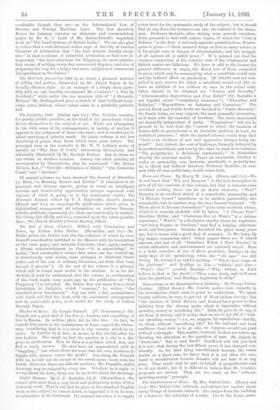Public Finance. By C. F. Bastable, LL.D. (Macmillan.)—We cannot give
more than a very brief and perfunctory notice of this elaborate work. That it will find its place as the standard English work on the subject, we cannot doubt, so impartial is it in its tone, so exhaustive in its treatment. Its original intention is to supply a text-book for the systematic study of the subject ; but it should find its way from the lecture-room into the cabinet of the states- man. Professor I3astable, after stating some general considera- tions, proceeds to deal with various topics, of which the "Cost of Defence" is the first. A. curiously apposite quotation from Montes- quieu is given :—" Each monarch keeps on foot as many armies as if his people were in danger of extermination ; and this struggle of all against all is called peace 1" It is pointed out that the common comparison of the relative cost of the Continental and British armies are fallacious. We have to add to the former the general difference in wages, the direct loss of those compelled to serve, which may be measured by what a substitute would cost, and the indirect effect on production. (If 500,000 men are com- pelled to give service for which a substitute would cost £20, we have an addition of ten millions at once to the actual cost). Other objects to be obtained are "Justice and Security," "Administrative Supervision and Poor Relief" (Dr. Bastable is not hopeful about "compulsory insurance "), "Education and Religion," "Expenditure on Industry and Commerce." The second, third, and fourth books are devoted to " Public Revenue," the fourth being, we may suppose, the most generally interesting, as it deals with the varieties of taxation. The views enunciated are decidedly independent of party. " Progressives " will not be pleased to be told that the "extent to which the taxation of houses falls on ground.rent is an insoluble problem, at least, for statistical purposes ; " while the landed interest would deny that "there is no evidence of new and oppressive charges being im- posed." And, indeed, the cost of highways, formerly defrayed by those that used them, and now by the rates on land, is an instance. "The property-tax is decisively condemned ; " it diminishes directly the national wealth. Taxes on succession, whether to realty or personalty, are, however, practically a property-tax. As to direct and indirect taxation, Professor Bastable, in com- mon with all sane politicians, would retain both.


































 Previous page
Previous page